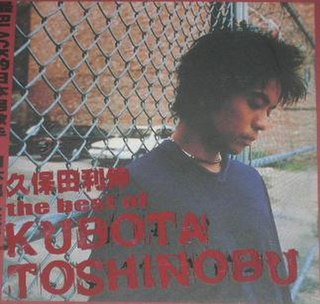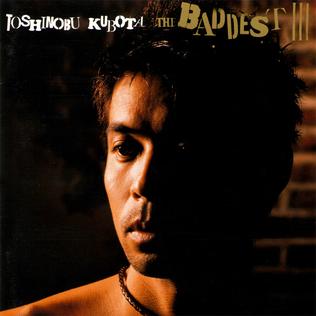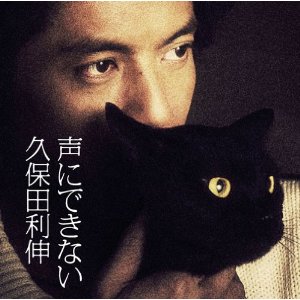
La La La Love Thang is the ninth studio album of Japanese singer Toshinobu Kubota, released on December 2, 1996. The album has been certified triple platinum by the Recording Industry Association of Japan. It was also successful in international music markets and yielded two singles: "Niji No Grand Slam" and "La La La Love Song". Kubota then embarked on his first international concert tour in 1996, which he titled the Oyeees! Tour. A live album, Toshinobu Kubota Concert Tour '96: Oyeees!, was released which featured footage from the tour. As of February 2012, La La La Love Thang has sold over 840,000 copies worldwide.
The discography of Japanese R&B singer Toshinobu Kubota consists of eighteen studio albums, ten compilation albums, two tribute albums, and over seventy singles. In 1985, Kubota signed with Sony Japan and began producing and writing songs for many of label's singers and groups. Under the label, Kubota released his first single, "Shitsui no Downtown" in June 1986, followed by "Time Shower ni Utarete" in December. Both songs were well received by radio, placing fifty-three and thirty-five on the Oricon Singles Chart. In September 1986, his debut album, Shake It Paradise, peaked at number twenty-two and remained on the Oricon Albums Chart for seven consecutive weeks. Shake It Paradise became certified million. The following year in 1987, Kubota's second studio album, Groovin', debuted at number thirty-three and was certified million. In February 1988, Kubota released "You Were Mine", which debuted at number two. In September 1988, Kubota released his third album, Such A Funky Thang!. The album peaked at number one and was certified million. The album also spawned the top-charted single "Dance If You Want It", which peaked at number three. In 1989, Kubota released his compilation album, The Baddest. The album also peaked at number one and was certified million.

The Baddest is first compilation album of Japanese singer Toshinobu Kubota, released on October 8, 1989. The album peaked at number one and was certified million.

Bumpin' Voyage is the seventh studio album of Japanese singer Toshinobu Kubota, released on January 28, 1995. The album charted at number 1 on the Oricon Albums chart and remained on the charts for total of 12 weeks. The album sold a total of 600,000 units, reaching double platinum certification. In September 1995, Kubota re-recorded most of the album into English language and released the material on his eighth studio album Sunshine, Moonlight.

Gold Skool is the sixteenth studio album of Japanese singer Toshinobu Kubota, released on August 3, 2011. The album charted at number 3 on the Oricon Albums chart and remained on the charts for total of 18 weeks. The album sold over 78,124 units in Japan.

For Real? is the 14th studio album of Japanese singer Toshinobu Kubota, released on March 1, 2006. The album charted at number 13 on the Oricon Albums chart and remained on the charts for total of 9 weeks. The album sold over 33,000 units in Japan.

Soul Tree: A Musical Tribute to Toshinobu Kubota is a tribute album by various artists, released on February 25, 2004. The album was a tribute to Japanese singer-songwriter and musician Toshinobu Kubota. The album features performances by BoA, Soul'd Out, The Gospellers, Naniwa Express, Mika Nakashima, Soulhead, Atsushi, Sowele, Skoop On Somebody, Misia, Junpei Shiina with dance man, Rhymester, and Super Butter Dog Marcket. The album charted at number 9 on the Oricon Albums chart.

The Baddest II is a compilation album of Japanese singer Toshinobu Kubota. The album released on September 22, 1993, summing up various singles from Kubota. The album peaked at number one and spent twenty-three weeks on the Oricon Weekly Albums chart. The album became certified triple platinum, selling over 791,000 copies in Japan.

Toshinobu Kubota Greatest Hits is the third series of greatest hits compilations by Japanese singer Toshinobu Kubota. The album was only released in 1998 in Hong Kong on the Sony Music Entertainment Hong Kong recording label.

The Best of Kubota Toshinobu is the fourth album in a series of greatest hits compilations by Japanese singer Toshinobu Kubota. The album was only released in 1999 in Taiwan on the Sony Music Entertainment Taiwan recording label. The album sold nearly ten thousand copies in Taiwan.

The Baddest: Only For Lovers In The Mood is a compilation by Japanese singer Toshinobu Kubota. The album was released on July 24, 2002 on Sony Music Entertainment. Unlike its predecessors, the album only features love songs, excluding the Kubota's hit singles from the album. The album charted at number 22 on the Oricon Weekly Albums chart and remained on the charts for two weeks.

The Baddest III is a compilation released by Japanese singer Toshinobu Kubota, on December 4, 2002. The album charted at number 3 on the Oricon Weekly Albums chart and stay on the charts for a total of eighteen weeks. The album also sold over 316,000 units in Japan.

Love & Rain: Love Songs is a compilation album by Japanese singer Toshinobu Kubota. The album was released on November 24, 2010 on Sony Music Entertainment Japan and peaked at number 11 on the Oricon Weekly Albums chart. The album features the songs "Love Rain " and "Rain", which had just been newly recorded at the time.

"Koe ni Dekinai" is a song recorded by Japanese R&B singer Toshinobu Kubota for his sixteenth studio album, Gold Skool (2011). The song was released on September 28, 2011, as the second single from the album.

"Nagareboshi to Koi no Ame" is a song recorded by Japanese R&B singer Toshinobu Kubota for his sixteenth studio album, Gold Skool (2011).

"Love Rain " is a song recorded by Japanese R&B singer Toshinobu Kubota for his compilation album, Love & Rain: Love Songs (2010). The song was released on June 6, 2010, as the lead single from the album.

Timeless Fly Tour was the concert tour by Japanese singer-songwriter Toshinobu Kubota in support of his fifteenth album Timeless Fly.
Aika Ōno is a Japanese singer and songwriter. She is contracted with the Giza Studio record label

Crystallize: Kimi to Iu Hikari is the third studio album by Japanese band Garnet Crow. It was released on November 12, 2003 under Giza Studio.
















